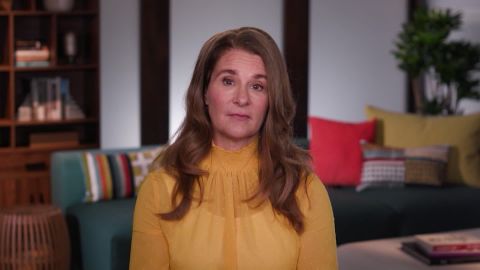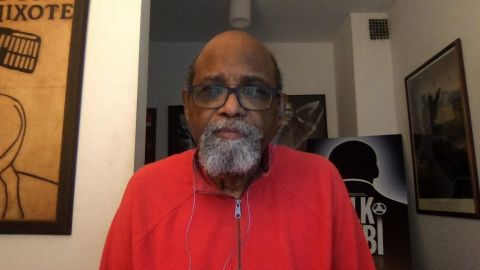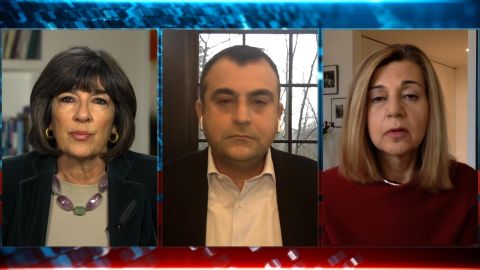Read Transcript EXPAND
CHRISTIANE AMANPOUR: We turn to the pandemic now, and the huge toll it is taking on women, women’s jobs are nearly twice as vulnerable as men’s during this crisis. And of course, while women lose paid jobs, they are taking on more unpaid work in the home, like home schooling of their children and caring for their family members. And so, the release of the paperback edition of Melinda Gates’ book “The Moment of Lift: How Empowering Women Engages and Changes the World” is particularly timely. And here she is talking to our Walter Issacson about this issue, and the all-important COVID vaccine.
WALTER ISAACSON: Thank you, Christiane. And, Melinda Gates, welcome to the show.
MELINDA GATES, AUTHOR, “THE MOMENT OF LIFT: HOW EMPOWERING WOMEN ENGAGES AND CHANGES THE WORLD”: Thanks for having me, Walter.
ISAACSON: Your new book out in paperback, “The Moment of Lift” is about the empowerment of women. And yet, this coronavirus pandemic seems to be great setback for that. In fact, in the last jobs report, men gained about 16,000 jobs but women lost about 140,000 jobs, why is that and what can we do?
GATES: Yes, the pandemic has really set women back. And, you know, when I wrote this book in 2019, we thought we were moving forward for women. But what the pandemic has done in terms of jobs are two things. One is, women in society in the United States quite often hold those low-wage jobs with people in their homes now not going out to getting services, and as many of the goods as before, and those jobs have been lost, so that is one. The other is that women are doing an inordinate amount of childcare at home. It is right here in our faces, they’re helping kids who aren’t in school, keep their homework up, they’re getting the meals on the table, they’re doing the laundry, that childcare work and even some of elder care is making women step back in their careers, because they are saying, I just can’t do it all.
ISAACSON: You know, the caregivers, the role that women are playing in that, that is something I think you have urged both in writing and maybe in the conversations with President-Elect Biden, that we have a czar that oversees how we do care giving.
GATES: Yes, absolutely. I have spoken to President Biden — President- Elect Biden about that several times, and he sees the importance of this childcare sector and as well the elderly care. I mean, he was a dad who lost his wife and raised two sons while he was a senator. He understands how hard that is, and he thinks of this childcare as the infrastructure for our economy. He knows that we can’t build back and have a swift recovery unless we can get women back into the labor force, and that means having things like a good paid family medical leave policy.
ISAACSON: How do you and Bill differ? What do you bring differently in the way you approach the foundation that you co-founded?
GATES: Well, I think that both of us, you know, we have a huge commitment to the foundation. We share the same values in terms of what the foundation does. Bill has, not surprisingly, one of the gifts is a very technocratic focus, and it is something that benefited him enormously at Microsoft and I think benefits the work at the foundation. I think I bring a bit more of the listening and human perspective. I think it’s — we both travel in the field, but I think what I have heard so often from men and women in villages and in very crowded cities about what they need, I can balance the — when we have a new tool, say for family planning or a new vaccine, the distribution piece of how do we get people to accept that technology or what’s right for them and how do we think of it from the full family perspective, because I see what it takes to raise children and hear from women what they need, and honestly, what holds them back from even being able to take up these new tools.
ISAACSON: To what extent has the pandemic set back the goals that you all were doing at the foundation?
GATES: Yes, it has set many of them back enormously. You know, poverty was on the decline around the world. It is now on the rise again. Hunger is on the rise. Hundreds of millions of children are out of school. Those are going to have long-term and lasting implications on the field of global health, global development and poverty elimination. And so, we have a lot of work ahead of us as a global health community.
ISAACSON: You and Bill have been focused on polio vaccines. Almost eradicating polio. What have you learned from that that applies to our vaccinating situation now and why is our vaccine situation rollout had gone so badly in your opinion?
GATES: Well, I think that one of the benefits that I will say of the polio vaccination program is we have learned what it really takes to spread true information and get people to accept things like polio drops. It has also left an enormous infrastructure across a country say like Nigeria that benefits then other vaccines when they come in, great laboratories, good scientists, good community acceptance. So, there is lots there, lots of rails to build on from polio and other vaccine campaigns. What — the reason I think we have such a lumpy distribution of vaccines, quite honestly, in the United States or that I know is that the current CDC was not used in the function that it was set up to be used. It was set up to really give advice to health commissioners in every single district in the United States. Because they were set aside, we now don’t have a federal plan for distributing vaccines. We have 50 different state plans, and that should not be. You want a mass coordinated effort to make sure that, first our healthcare workers get vaccines, then our most vulnerable populations, and we just don’t have a federal response today, and that is a shame.
ISAACSON: Why is it important that make sure that the whole world gets vaccinated rather than focus on ourselves?
GATES: Yes, if we don’t ensure that low- and middle-income countries also have great vaccine, great amounts of vaccine, what’s going to happen is we’re going to see this disease continue to bounce around the world, in country after country. So, we might eliminate it for a time in the United States or in Europe, but as it is bouncing around the world, it will come back inside our borders. And what it means is more death around the world, and what it also means is a much slower recovery in places like the United States or Europe, because our supply chains will continue to be messed up. Our travel industry won’t go back. Our manufacturing industry won’t go back as quickly as it could. So, it just makes not only ethical sense, but economic sense to make sure low- and middle-income countries also have widespread vaccination.
ISAACSON: One of the vaccines that you pushed with the Gates Foundation was the Oxford AstraZeneca one, and that’s now been approved for emergency authorization in England. Do you think that we should speed it up here so that can get approval?
GATES: I think that the FDA is a fantastic regulatory body and I think that they will roll it out in the United States when they feel they have all of the right data for our population. And yes, our foundation has been behind about a half dozen vaccine, that’s because we need lots of different tools for around the world, particularly it is going to benefit the low- and middle-income countries when we have vaccines that are single dose and that don’t require the vast cold change that Moderna or the Pfizer vaccine require. Thank God we have those two vaccines, but to distribute it out everywhere it needs to go in the world, we need some of these vaccines that will be a little bit easier to distribute.
ISAACSON: Some of the pushback against the vaccines is very odd, especially the paranoid wacky conspiracy theories that involve you and your husband and the Gates Foundation on vaccines. What do you make of those? How did those happen and how can you fight them?
GATES: Well, disinformation is always disturbing. And it is disturbing, because it causes death. And so, what I tell people is talk to your doctor. I mean, you’re going to put a biologic tool in your body. So, of course, there’s going to be some hesitancy. That makes sense and this is a new tool. It is a safe tool. But when you talk to your doctor, he or she knows what’s right for you or for your children. And so, we just have the give people sensible information. The good news, Walter, is that the vaccine hesitancy is already starting to go down and I think it was high because of the spread of disinformation, I think it was high because there’s a lot of anxiety in society right now, we are all home, we’re all worried about this disease. But I think as you start to see more people getting the vaccines — we’re already hearing, at least in Seattle, people clamoring for vaccines. And I think it’s going to roll out once we get past some of these distribution bumps quite readily, I think people are going to accept the vaccine.
ISAACSON: You and Bill have talked to incoming President Joe Biden a few times and talked to his team a lot. What are you pushing for him to do on this pandemic?
GATES: We are pushing President-Elect Biden to make sure that there is a national federally-led coordinated testing and tracing plan and as well a nationally-led vaccination plan. And I have to be honest, it doesn’t take much pushing, he already knows that is needed, he knows he wants and needs to empower the CDC fully, and he’s got great advisers around him who are already planning to do that. We’ve also obviously talked with him about climate change, and its importance on the long-term agenda, and as well this childcare infrastructure that needs to be rebuilt.
ISAACSON: One thing that you do is you always go on site to see how the foundation is doing, especially in places like Africa and India. And recently, you’ve been taking Jen, your oldest daughter, and there’s a wonderful tale in the book about blankets and how she wanted to give blankets as a young kid and then another tale about the headlamp she was wearing and how you realize you can empower girls who had trouble with their homework. Tell us about those.
GATES: Sure. So, when Jen was about 15, we went and stayed with a family who welcomed us into their home in Rural Tanzania and it was amazing, several days we spent with them. And I think one of the things that struck my daughter, Jen, and me at the time was how many chores the women had to do. You know, we cooked over the fire, we chopped firewood, we put the dinner on the table. But then at 10:00 at night, we were out under the stars doing the dishes. And one of the girls in the family, her twin brother, had made it on to secondary school. She had not yet passed her exam. She had not passed them the first time and she was studying to pass them the second time. She was very shy, but she was about also about 15. As soon as my Jen came out of our hut with the head lamp on, this girl, Grace, went straight to my daughter, Jen, and said, when you leave, can I have your head lamp, and Jen said, of course you can, and she said, why? And she said, because when we are finished with the dishes at night out here, I could then go study for my exams. And it just shows you all of this unpaid labor that the girls do. Her brother was doing the studies in the afternoon when he came home from school. But the difference that a girl has in her life because all of this unpaid labor or the difference if she has a head lamp so she can study and empower herself, it makes a profound difference.
ISAACSON: You talk about prioritizing women’s leadership. How is that been setback by the pandemic and what can we do?
GATES: Well, women, first of all, must have a seat at the table at everywhere that decisions are being made. So, whether that’s policymaking in politics and in our halls of Congress or in our statehouses, whether those are decisions being taken on Wall Street, whether those are decisions in the tech industry, which is changing all of society, or in media that’s telling our stories, when you have women and people of color with the seat at the table with a full voice and decision-making authority, they make different decisions on behalf of society, because they see society in its fullness and the richness. So, just as one example, for women in politics, what do we need to do? Not just to train women in how to enter political office but show them opportunities, open our networks to them and make sure they are funded. And to be frank, we can do that in all industries. We can create pathways into things like tech and finance in ways that are pretty blocked for women today.
ISAACSON: Why are there so few women in technology?
GATES: Because at the time I was in college, late 1980s, I’m dating myself here, women were on the rise in computer science. I’m a computer science major. And then it went precipitously downward and it’s because the personal computer was introduced as a game for young boys. And boys became quite interested in it, the games were shoot them up games, which girls were not interested in it. And the more boys you got into it, the more boys and men you got into it. And now, it’s become so genderfied that people think, oh, well, women can’t be coders. We don’t see women as coders. We don’t have a class in college that welcomes the women in. So, that first freshman class in college that’s computer science, if a woman hasn’t studied computer science in high school, she doesn’t feel welcomed because the boys have been programming for so long. Whereas if you have a class, like many universities are starting to have, an opening freshman class that are real world problems, women will not only get into it, they will get interested and they’ll stay in computer science. And so, we need to change that and we need to change the computer industry so that women-led businesses are funded, which they are not today by venture capitalist, and so, that the computer science industry, their tech industry welcomes women into those coding jobs more readily than they do today.
ISAACSON: One of the powerful parts in your book is this chapter about the power of letting your heart break. Give me an example of where you and Bill had your heart broken.
GATES: I think that both of us — I know both of us being out in low- income countries and seeing the great lengths that a mother/father will go to, to keep their child alive. We have both experienced that. We have both been in places where HIV was such a stigma that the person, even though medications were available, wouldn’t go get them. We both sat and heard stories of unbelievable violence towards women or towards men who had HIV. Those stories break your heart and I would say they enliven both of us to keep doing the work that we are trying to do with the foundation, so that people can live a healthy and productive life.
ISAACSON: Melinda Gates, thank you so very much for being with us.
GATES: Thanks for your questions, Walter. I really appreciate it.
About This Episode EXPAND
Former FBI agent Ali Soufan and journalist Margaret Sullivan assess the threat of domestic terrorism leading up to Inauguration Day. Acclaimed director Sam Pollard discusses his new film “MLK/FBI.” Melinda Gates explains how the pandemic is setting women back and how to get them back into the workforce.
LEARN MORE


